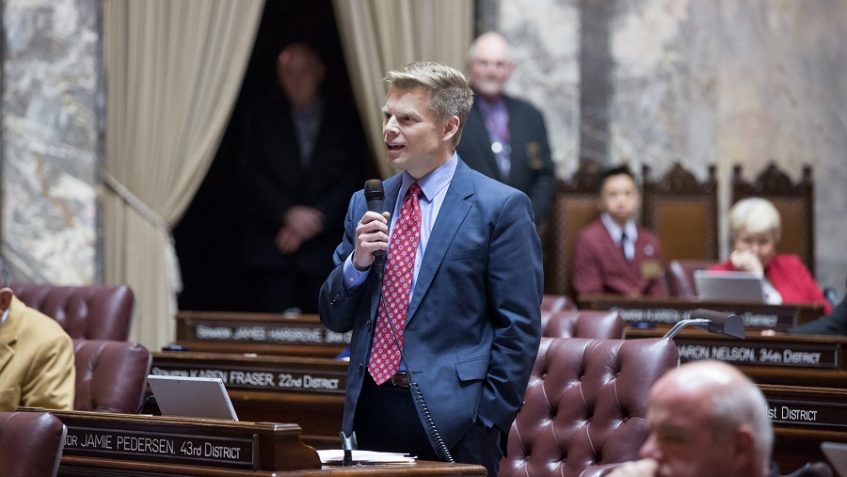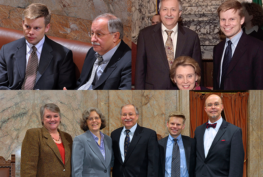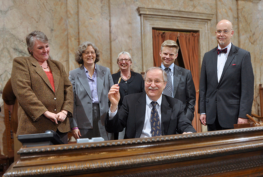Greetings from Olympia!
We are wrapping up the fourth week of the 2016 legislative session. Most of our time so far has been spent in committee, reviewing the 2,000 or so bills that legislators have introduced this session (and some left over from 2015). This year I serve as ranking member on the Senate Law & Justice Committee, and also serve on the Ways & Means Committee and the Financial Institutions & Insurance Committee. Today is our first big cutoff, when bills that have not passed out of committee will die for this year. I wanted to update you on some issues that I have been working on. I also wanted to invite you to attend our 43rd District Town Hall on Saturday, Feb. 20 from 1 p.m. to 2:30 p.m. at the Erickson Theater at Seattle Central College. House Speaker Frank Chopp and I will discuss the legislature’s work and answer your questions on various issues before the state.
Funding Public Education
My top priority this year, as usual, is increasing funding for our public schools. As the father of four students at Stevens Elementary on north Capitol Hill, this issue is personal to me. The Supreme Court has directed the state to reduce its reliance on local property tax levies to fund teacher pay and other aspects of basic education. At the request of the Gov. Inslee, a small group of legislators worked to develop a bipartisan plan to address this issue. The House has already passed the plan; Senate Republicans, unfortunately, have amended the bill to remove our deadline for compliance and disclaim responsibility for school construction. Although disappointing, that is not surprising — 19 of the 26 members of that caucus signed a letter last summer urging the legislature to commence federal litigation to overturn the McCleary decision. I fear that we will resolve this issue only with a change in control of the Senate or a more drastic intervention by the Supreme Court.
Because of the rapid enrollment growth in Seattle Public Schools and direction from the Supreme Court and the voters to reduce class sizes, we also need to increase state support for school construction. I am proud to have introduced SB 5859, which would revise the formula for state school construction funding. For many years, the formula has underfunded school construction across the state; it especially disadvantages Seattle Public Schools. Last year, I helped lead efforts by the Seattle delegation to secure $25 million in extra funding that will help to reopen two closed elementary schools to address overcrowding. This year, we are working together again to request about $7 million to expand West Woodland Elementary School. Both of these items await action by the Senate Ways & Means Committee, which handles the operating and capital budgets for the state.
Transgender Discrimination
Although Senate Democrats have tried to focus this year on education funding, mental health, and homelessness, others have been intent instead on occupying our limited time with divisive policies attacking our clean energy initiative; rolling back abortion rights for women by prohibiting “sex-selection abortions”; and preventing transgender people from using restrooms and locker rooms corresponding with their gender identity. I have been fighting all of these bills, and wanted to take a moment to write in particular about civil rights protections in our state for transgender people. Bills seeking to roll back these protections have been before me on the Senate Law & Justice Committee.
As you may know, Washington passed a law in 2006 that provides protection for transgender people against discrimination in employment, housing, and places of public accommodation. I am proud that that landmark law was the product of decades of work by two of my predecessors in this seat, Senators Cal Anderson and Ed Murray. Since that law was passed 10 years ago, transgender people in Washington have been able to use restrooms and locker rooms that match their gender identity. Nothing in Washington’s 2006 law changed the fact that separate facilities exist for men and women. The law allows a person who has undergone or is undergoing gender transition to use the restroom or locker room that matches the gender they live every day. Nothing in the law or in the adopted rules changes the fact that it is illegal to enter a restroom or locker room to harm or sexually harass people, or to invade their privacy.
In November 2015, the Washington Human Rights Commission adopted rules to clarify how Washington schools and businesses should implement the Law Against Discrimination to protect transgender people. Those who have consistently opposed our progress on LGBT issues thought that they had a chance to roll back these protections and have filed multiple bills to attempt to do so.
All of us, including transgender people, care about safety and privacy in bathrooms and locker rooms. I understand that there has been confusion and concern recently about what implementation of these non-discrimination regulations means. However, the experience that we’ve had over the past 10 years in Washington, as well as the experiences in many other places, show that non-discrimination laws and policies can be successfully implemented while upholding the safety of everyone.
I am therefore proud to support the rules implementing our hard-won anti-discrimination law. I have led the fight against bills seeking to overturn the rules in the Senate Law & Justice Committee and will continue strongly opposing efforts by legislators to reverse them or partially repeal our law.
My Bills
In addition to my work on the school construction funding formula, I have been working on several other issues that I wanted to mention briefly.
SB 6550 would allow terminally ill patients to access drugs that have passed initial testing but have not yet been approved by the FDA. Many potentially lifesaving medications and treatments in the long testing and approval process could potentially save the life of someone who has only months, weeks or days to live. “Right to try” laws have passed in more than 20 states and give hope to people who are fighting for their lives. This bill has passed out of the Senate Health Care Committee and awaits action in the Senate Rules Committee.
SB 5029 concerns “digital assets” – which could be anything from your photos stored in the cloud and e-mail correspondence to online banking and health records. Under an antiquated federal law, these assets can be stranded if you die or become incapacitated. SB 5029 would allow you to decide whether you would like would your fiduciaries (such as a guardian or the personal representative of your estate) to have access to your digital assets. The bill passed out of the Senate Law & Justice Committee and is currently on the Senate floor calendar awaiting a vote.
SB 5635 would enact a Washington version of the Uniform Power of Attorney Act. This bill is the product of many years of work by the national Uniform Law Commission (on which I also serve) and several sections of the Washington State Bar Association. It would modernize our power of attorney statute, clarifying for everyone the uses to which a power of attorney may be put and protecting principals against potential abuse. This bill also passed out of the Senate Law & Justice Committee and awaits a vote by the full Senate.
Thank you for the privilege of representing you here in Olympia. I welcome your comments and questions anytime.
Best wishes, Jamie
Senator Jamie Pedersen
43rd Legislative District
Jamie.Pedersen@leg.wa.gov
(360) 786-7628




